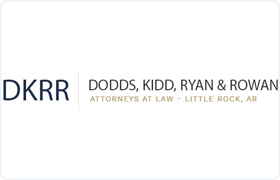Sherwood DUI-DWI Lawyer, Arkansas
Sponsored Law Firm
-
 x
x

Click For More Info:
-
Dodds, Kidd, Ryan & Rowan, Attorneys at Law
313 W. 2Nd St. Little Rock, AR 72201» view mapCriminal Defense Unrelenting Pursuit Of Justice
Our lawyers are committed to taking the time to get to know you, your legal concerns and the ideal resolution to your case that will be meaningful to you.
800-936-8091
FREE CONSULTATION
CONTACTGeorge Bircham Morledge
Domestic Violence & Neglect, Misdemeanor, DUI-DWI, Criminal
Status: In Good Standing
Leslie Roger Ablondi
Traffic, Litigation, Divorce & Family Law, DUI-DWI
Status: In Good Standing Licensed: 46 Years
 Judson Kidd Little Rock, AR
Judson Kidd Little Rock, AR AboutDodds, Kidd, Ryan & Rowan, Attorneys at Law
AboutDodds, Kidd, Ryan & Rowan, Attorneys at Law Practice AreasExpertise
Practice AreasExpertise
